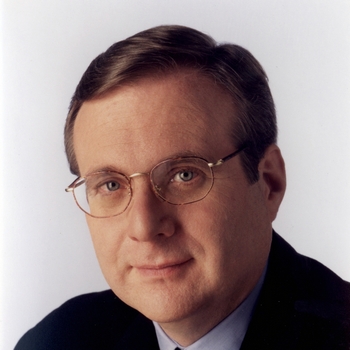DOCTOR OF PHILOSOPHY (HONORIS CAUSA)
 Entrepreneur and investor, Paul Allen was born in 1954, in Seattle, Washington. While attending the Lakeside School outside Seattle, 14-year-old Allen met 12-year-old Bill Gates, a fellow student and computer enthusiast.
Entrepreneur and investor, Paul Allen was born in 1954, in Seattle, Washington. While attending the Lakeside School outside Seattle, 14-year-old Allen met 12-year-old Bill Gates, a fellow student and computer enthusiast.
Less than a decade later, in June 1975, Allen and Gates founded Microsoft with the intention of designing software for the new wave of personal computers. By the time Allen arranged for Microsoft to buy an operating system called Q-DOS for $50,000, the company had already supplied software for emerging companies such as Apple and Commodore.
A prolific entrepreneur and relentless investor, Allen overcame a life-threatening illness, and built a commanding business empire by brilliantly multiplying his investments in information technology companies, new technology, media and sports. Driven by his dream of a wired world society—in which virtually everyone is online, accessing services of all types – in 1986 he set up Vulcan Ventures in order to research possible investments and founded a Silicon Valley think tank in 1992 called Interval Research. Always hoping to find the next big idea lurking somewhere just out of sight, Paul has pursued an eclectic array of possibilities which has resulted in him holding 43 patents from the United States Patent and Trademark Office. This penchant for invention and innovation has coined him the reputation as “The Idea Man”.
He harnesses new frontiers of possibility and discovery from all quarters, from the realms of outer space to the creative arts. As a space enthusiast, he is at the helm of the first privately funded initiative to put a civilian in suborbital space, and to develop a space transport system. Another raft of innovations is at the forefront of systems for oceanographic and atmospheric monitoring. Allen pursues a keen interest in urban revitalisation, particularly in his home-city and has been a key developer and investor in the development of the neighbourhoods of Seattle, creating these as a biotechnology hub and mixed-use community.
Himself a vibrant and active musician and an accomplished guitarist, Allen has an innate understanding of the role of arts, music and culture in the evolution of humankind whilst unleashing novel ideas and ways of thinking for generating alternative solutions.
Paul Allen has cascaded his business acumen to re-mould charitable giving, re-sculpting this as "venture philanthropy". Towering in stature is the Allen Institute for Brain Science, which is a non-profit corporation and a medical research organisation. In 2008, Allen took this further and unveiled the online "Allen Spinal Cord Atlas" mouse gene map, which offers profound potential for researchers to unlock the mysteries of the spinal cord and how it is altered during disease or injury.
The charitable social entrepreneurship incubated by Allen is aimed at transforming individual lives and strengthening communities by fostering innovation, creating knowledge, and promoting social progress. Projects of world-renown that have been seeded and now blossom famously, include the Experience Music Project, Seattle Cinerama Theatre, the Science Fiction Museum and Hall of Fame, the Flying Heritage Collection (airworthy vintage military aircraft) and the Allen Telescope Array (ATA).
In recognition of his provocative and catalytic contribution to innovations and inventions that have brought the technology of the digital age within reach of millions of people around the world; and for his entrepreneurial capability in the field of computing and informatics, it is an honour for Nelson Mandela Metropolitan University to confer the degree of Doctor of Philosophy (honoris causa) on Paul Gardner Allen.